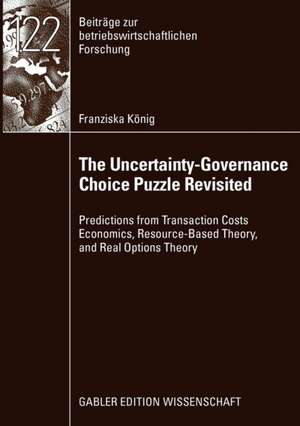The Uncertainty-Governance Choice Puzzle Revisited: Predictions from Transaction Costs Economics, Resource-Based Theory, and Real Options Theory: Beiträge zur betriebswirtschaftlichen Forschung, cartea 122
Autor Franziska König Cuvânt înainte de Prof. Dr. Thomas Mellewigten Limba Engleză Paperback – 25 mar 2009
Din seria Beiträge zur betriebswirtschaftlichen Forschung
-
 Preț: 412.68 lei
Preț: 412.68 lei -
 Preț: 419.21 lei
Preț: 419.21 lei -
 Preț: 498.73 lei
Preț: 498.73 lei - 15%
 Preț: 586.88 lei
Preț: 586.88 lei -
 Preț: 446.16 lei
Preț: 446.16 lei - 15%
 Preț: 585.40 lei
Preț: 585.40 lei -
 Preț: 453.01 lei
Preț: 453.01 lei -
 Preț: 419.06 lei
Preț: 419.06 lei - 15%
 Preț: 581.79 lei
Preț: 581.79 lei - 15%
 Preț: 443.81 lei
Preț: 443.81 lei - 15%
 Preț: 470.06 lei
Preț: 470.06 lei - 15%
 Preț: 442.48 lei
Preț: 442.48 lei - 15%
 Preț: 526.50 lei
Preț: 526.50 lei - 15%
 Preț: 696.82 lei
Preț: 696.82 lei -
 Preț: 418.83 lei
Preț: 418.83 lei -
 Preț: 381.98 lei
Preț: 381.98 lei -
 Preț: 450.88 lei
Preț: 450.88 lei -
 Preț: 480.83 lei
Preț: 480.83 lei - 15%
 Preț: 587.53 lei
Preț: 587.53 lei - 15%
 Preț: 443.31 lei
Preț: 443.31 lei -
 Preț: 413.07 lei
Preț: 413.07 lei -
 Preț: 381.81 lei
Preț: 381.81 lei - 15%
 Preț: 539.41 lei
Preț: 539.41 lei -
 Preț: 481.34 lei
Preț: 481.34 lei -
 Preț: 414.80 lei
Preț: 414.80 lei -
 Preț: 383.12 lei
Preț: 383.12 lei -
 Preț: 479.47 lei
Preț: 479.47 lei - 15%
 Preț: 447.89 lei
Preț: 447.89 lei -
 Preț: 417.52 lei
Preț: 417.52 lei -
 Preț: 416.71 lei
Preț: 416.71 lei -
 Preț: 412.51 lei
Preț: 412.51 lei -
 Preț: 414.21 lei
Preț: 414.21 lei - 15%
 Preț: 443.31 lei
Preț: 443.31 lei -
 Preț: 421.17 lei
Preț: 421.17 lei -
 Preț: 412.89 lei
Preț: 412.89 lei -
 Preț: 412.51 lei
Preț: 412.51 lei -
 Preț: 426.18 lei
Preț: 426.18 lei -
 Preț: 418.83 lei
Preț: 418.83 lei -
 Preț: 421.72 lei
Preț: 421.72 lei -
 Preț: 414.65 lei
Preț: 414.65 lei -
 Preț: 416.92 lei
Preț: 416.92 lei -
 Preț: 414.04 lei
Preț: 414.04 lei -
 Preț: 416.92 lei
Preț: 416.92 lei -
 Preț: 414.42 lei
Preț: 414.42 lei -
 Preț: 417.52 lei
Preț: 417.52 lei -
 Preț: 415.02 lei
Preț: 415.02 lei -
 Preț: 414.04 lei
Preț: 414.04 lei -
 Preț: 418.07 lei
Preț: 418.07 lei
Preț: 388.72 lei
Nou
Puncte Express: 583
Preț estimativ în valută:
74.38€ • 79.54$ • 62.02£
74.38€ • 79.54$ • 62.02£
Carte tipărită la comandă
Livrare economică 17 aprilie-01 mai
Preluare comenzi: 021 569.72.76
Specificații
ISBN-13: 9783834915337
ISBN-10: 3834915335
Pagini: 362
Ilustrații: XVI, 341 p. 45 illus.
Dimensiuni: 148 x 210 x 19 mm
Greutate: 0.43 kg
Ediția:2009
Editura: Gabler Verlag
Colecția Gabler Verlag
Seria Beiträge zur betriebswirtschaftlichen Forschung
Locul publicării:Wiesbaden, Germany
ISBN-10: 3834915335
Pagini: 362
Ilustrații: XVI, 341 p. 45 illus.
Dimensiuni: 148 x 210 x 19 mm
Greutate: 0.43 kg
Ediția:2009
Editura: Gabler Verlag
Colecția Gabler Verlag
Seria Beiträge zur betriebswirtschaftlichen Forschung
Locul publicării:Wiesbaden, Germany
Public țintă
ResearchCuprins
THEORY.- STATE-OF-THE-ART: EMPIRICAL WORK ON UNCERTAINTY-GOVERNANCE CHOICE RELATIONSHIPS.- THE UNCERTAINTY-GOVERNANCE CHOICE PUZZLE REVISITED: RECONCILING THEORETICAL PERSPECTIVES.- EMPIRICAL DATA.- CONCLUSIONS & FUTURE RESEARCH.
Notă biografică
Dr. Franziska König promovierte als externe Doktorandin bei Prof. Dr. Thomas Mellewigt am Lehrstuhl für Unternehmensführung, insb. Wertschöpfungsorientiertes Wissensmanagement, an der Freien Universität Berlin. Sie ist derzeit als Managerin für Ressourcenplanung bei einer internationalen Unternehmensberatung tätig.
Textul de pe ultima copertă
What is the appropriate governance design for operating under uncertain conditions, such as emerging markets and innovative technologies? Although this question has plagued management practice and academic research for years, no unified answer has been found.
Franziska König examines the anatomy of uncertainty-governance choice relationships from different theoretical angles, including transaction costs economics, resource-based theory, and real options theory. The book sharpens single-theoretical explanations and determines their boundaries both conceptually and by providing a comprehensive “vote-counting” analysis of recent empirical research. Recent debates, which argue the optimal governance response to uncertainty, are resolved with three multi-theoretical models. Empirical results of a “policy-capturing” study, conducted in the context of strategic alliances, reveal that managers recognize different uncertainty problems and respond to them by applying distinct “decision policies” along an equity and a coordination dimension of governance.
Franziska König examines the anatomy of uncertainty-governance choice relationships from different theoretical angles, including transaction costs economics, resource-based theory, and real options theory. The book sharpens single-theoretical explanations and determines their boundaries both conceptually and by providing a comprehensive “vote-counting” analysis of recent empirical research. Recent debates, which argue the optimal governance response to uncertainty, are resolved with three multi-theoretical models. Empirical results of a “policy-capturing” study, conducted in the context of strategic alliances, reveal that managers recognize different uncertainty problems and respond to them by applying distinct “decision policies” along an equity and a coordination dimension of governance.


















